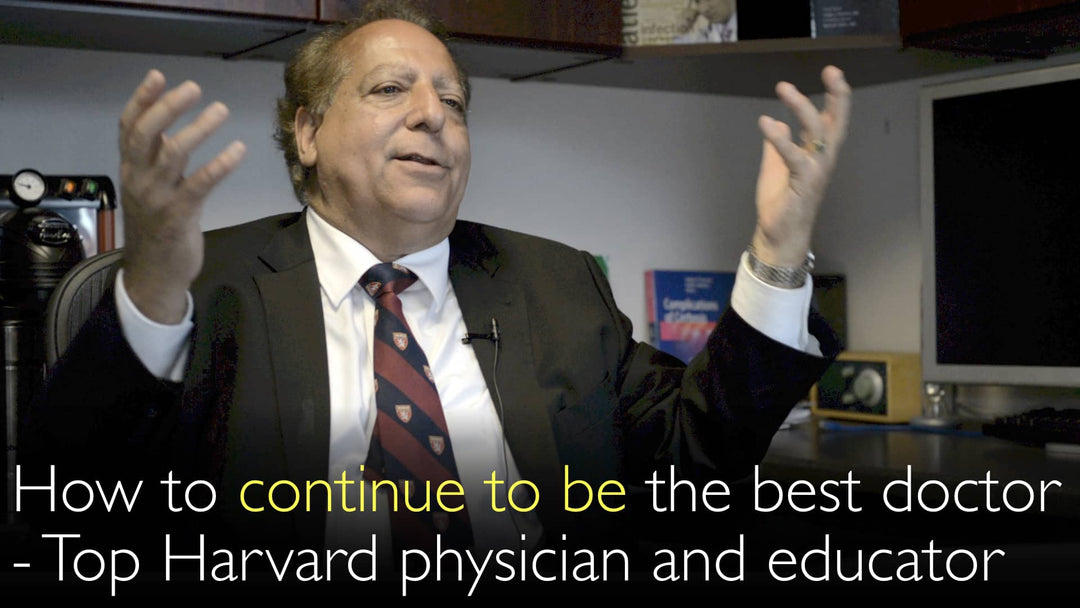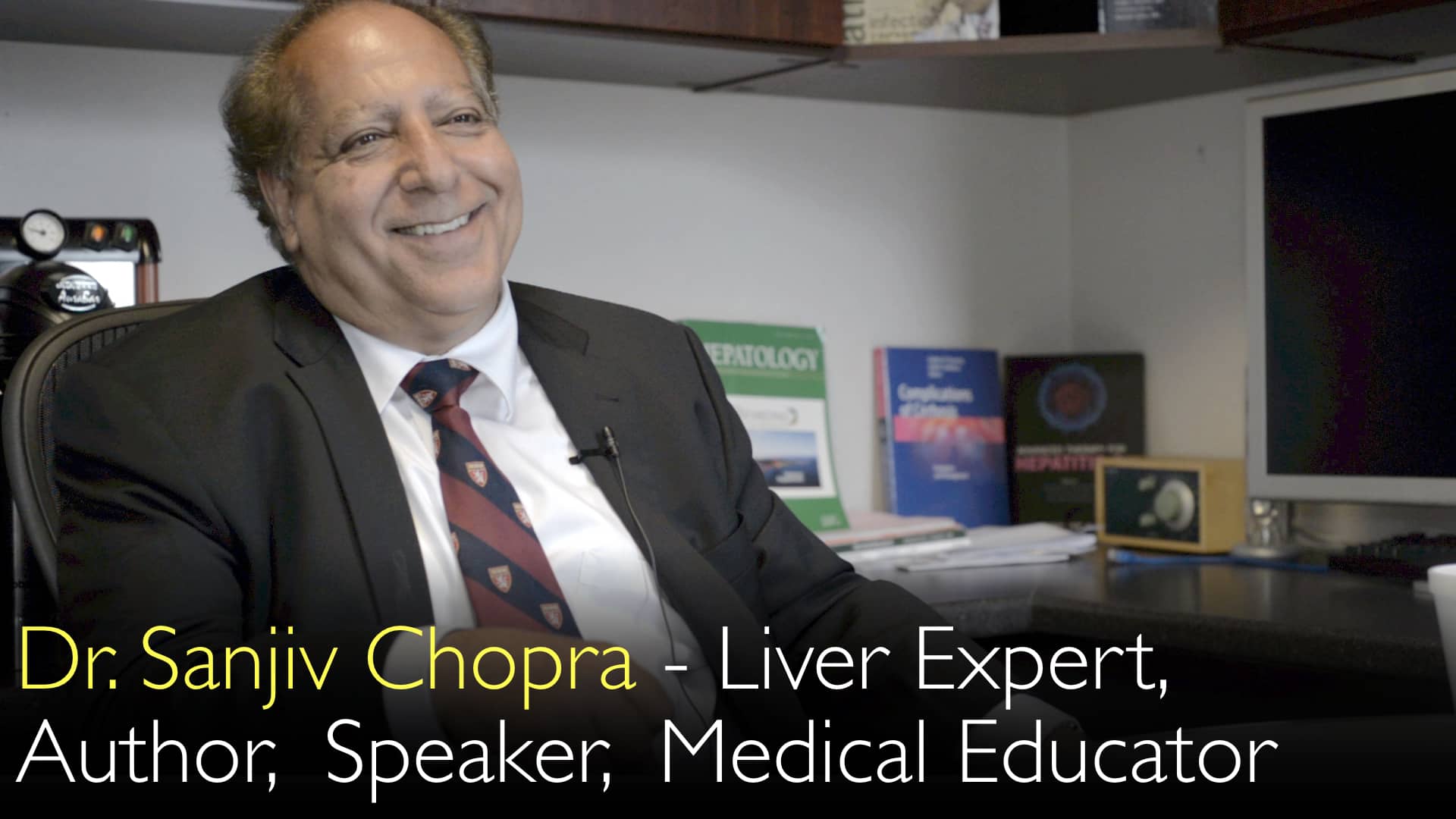מומחה מוביל בחינוך רפואי ודיקן לשעבר של בית הספר לרפואה של הרווארד לחינוך רפואי מתמשך, ד"ר סנג'יב צ'ופרה, MD, מסביר את המסגרת הקריטית בת שלושת החלקים ללמידה יעילה של רופאים: ליידע, להניע, וליישם. הוא מפרט אסטרטגיות מעשיות לקלינאים להישאר מעודכנים בהתקדמויות רפואיות, להימנע משחיקה, וליישם בהצלחה ידע חדש בתרגול היומיומי כדי לשפר תוצאות טיפול בחולים.
אסטרטגיות יעילות לחינוך רפואי מתמשך לרופאים
קפיצה לפרק
- מסגרת שלושת ה- I ללמידה
- התמודדות עם אתגר שימור הידע
- אסטרטגיית המחויבות לשינוי
- רכיבי למידה מעוררי השראה
- מנהיגות בחינוך רפואי
- טכניקות אינטגרציה מעשיות
- קידום צמיחה מקצועית ארוכת טווח
מסגרת שלושת ה- I ללמידה
ד"ר סנג'יב צ'ופרה, MD, פיתח מסגרת חינוכית חזקה במהלך כהונתו בת 12 השנים כדקן לחינוך רפואי מתמשך בבית הספר לרפואה של הרווארד. גישה זו, הידועה כשלושת ה- I, מספקת שיטה מובנית לרופאים להמשיך ללמוד ביעילות. המסגרת כוללת שלושה רכיבים חיוניים: מידע, השראה ואינטגרציה.
ד"ר סנג'יב צ'ופרה, MD, מדגיש שסגל בעל שם עולמי מעביר מידע למשתתפים באופן טבעי באמצעות המומחיות הקלינית וכישורי ההוראה שלהם. עם זאת, שינוי חינוכי אמיתי דורש מעבר להעברת מידע פשוטה וכולל אסטרטגיות השראה ואינטגרציה מעשית המשנות התנהגות רופאים ומשפרות תוצאות מטופלים.
התמודדות עם אתגר שימור הידע
החינוך הרפואי מתמודד עם אתגר משמעותי בשימור ידע שד"ר סנג'יב צ'ופרה, MD, מתייחס אליו ישירות. מחקרים מראים שבעוד רופאים מדגימים עלייה מיידית בידע לאחר קורסי חינוך רפואי מתמשך (CME), הציונים שלהם חוזרים לעיתים קרובות לרמות הבסיס בתוך שנה. מציאות מדאיגה זו מדגישה את הצורך הקריטי באסטרטגיות שימור למידה טובות יותר.
ד"ר סנג'יב צ'ופרה, MD, מסביר שלמידה מסורתית מבוססת הרצאות מספקת חיזוקי ידע זמניים אך נכשלת ביצירת שינוי מתמשך בפרקטיקה הקלינית. הפתרון טמון בפיתוח גישות שיטתיות שעוזרות לרופאים להמיר מידע חדש להרגלים קליניים ברי-קיימא ודפוסי קבלת החלטות.
אסטרטגיית המחויבות לשינוי
ד"ר סנג'יב צ'ופרה, MD, יישם טכניקה יעילה הנקראת "מחויבות לשיפור" שמגבירה משמעותית את אינטגרציית הלמידה. שיטה זו כוללת הבאה של רופאים לרשום שינויים ספציפיים וברי-ביצוע שיישמו מייד לאחר כל מפגש חינוכי. התהליך כולל זיהוי שלושה שינויים מעשיים קונקרטיים ומחויבות פורמלית אליהם עם חתימה ותאריך.
לדוגמה, לאחר הרצאה על הפטיטיס C, רופא עשוי להתחייב לבדוק נוגדני הפטיטיס A ו-B בכל חולי הפטיטיס C, לשאול על עישון מריחואנה בשל הסיכון לפיברוזיס, ולבצע סקר לתסמיני קריו-גלובולינמיה. מחויבות מתועדת זו מעלה באופן דרמטי את הסבירות לשינוי מעשי בפועל לפי מחקר שפורסם על ידי ד"ר צ'ופרה ועמיתיו.
רכיבי למידה מעוררי השראה
רכיב ההשראה בחינוך רפואי ממלא תפקיד קריטי במניעת שחיקה רופאים ושמירה על מעורבות מקצועית. ד"ר סנג'יב צ'ופרה, MD, שילב הרצאות מפתח מעוררות השראה וסימפוזיונים על מנהיגות בקורס החינוך הרפואי המתמשך (CME) בן השבוע לרפואה פנימית שניהל עם עמיתיו ד"ר מרטין אברהמסון וד"ר מארק זיידל.
מפגשים מעוררי השראה אלה כללו דוברים יוצאי דופן ביניהם קפטן צ'ארלי פלאמב, אסיר מלחמה לשעבר מווייטנאם, שנשא נאומים חזקים על תשוקה וביצועים. ד"ר אלווארו פסקואל-ליאונה, מדען מוח בעל שם עולמי, הציג על הנירוביולוגיה של מנהיגות, וחקר כיצד נוירוני מראה משפיעים על יעילות מנהיגות ודינמיקות צוות.
מנהיגות בחינוך רפואי
פיתוח רופאים יעיל דורש עקרונות מנהיגות חזקים החורגים מידע קליני. ד"ר סנג'יב צ'ופרה, MD, מדגיש שמנהיגים חייבים להנחות ולטפח אחרים, מגלמים את מטפורת אריזת המצנחים שהופצה על ידי קפטן פלאמב. מושג זה מדגיש שמנהיגים מצליחים עוזרים להכין אחרים לאתגרים ותומכים בהתפתחותם המקצועית.
רכיב המנהיגות בחינוך רפואי מתמשך עוזר לרופאים לפתח כישורים בשיפור איכות, הגברת סטנדרטים ביצועיים והובלה בדוגמה אישית. כישורים אלה חיוניים לרופאים שחייבים ליישם שינויים בסביבות העבודה שלהם ולהשפיע על מערכות מתן שירותי בריאות.
טכניקות אינטגרציה מעשיות
טכניקות אינטגרציה מעשיות מהוות את אבן היסוד של חינוך רפואי מתמשך מוצלח. ד"ר סנג'יב צ'ופרה, MD, תומך בתוכניות יישום מובנות שגורמות לגשר על הפער בין רכישת ידע ויישום קליני. גישת "המחויבות לשינוי" מספקת שיטה מוחשית להבטחת שתוכן חינוכי מתורגם לטיפול מטופלים משופר.
מתודולוגיה זו עובדת particularly well כי היא יוצרת אחריות through תיעוד written ו-action items ספציפיים. רופאים שמתחייבים פורמלית לשינויי פרקטיקה נוטים more likely לעקוב through עם יישום, creating שיפורים מתמשכים ב-clinical decision-making שלהם ו-patient management strategies.
קידום צמיחה מקצועית ארוכת טווח
קידום צמיחה מקצועית דורש מחויבות מתמשכת למסגרת שלושת ה- I לאורך הקריירה של רופא. ד"ר סנג'יב צ'ופרה, MD, מדגים שחינוך רפואי מתמשך יעיל חייב לטפל בכל שלושת הרכיבים simultaneously כדי להשיג תוצאות משמעותיות ומתמשכות. גישה מקיפה זו עוזרת לרופאים לנהל עומס מידע while maintaining מצוינות קלינית.
על ידי שילוב מסירת מידע ברמה עולמית עם תוכן מעורר השראה ואסטרטגיות אינטגרציה מעשיות, רופאים יכולים להמשיך לפתח את כישוריהם לאורך הקריירה שלהם. שיטה זו not only משפרת ידע רפואי but also תומכת בסיפוק מקצועי ומונעת שחיקה, ensuring שרופאים remain competent ו-compassionate caregivers למטופלים שלהם.
תמליל מלא
ד"ר אנטון טיטוב, MD: פרופסור סנג'יב צ'ופרה הוביל את החינוך הרפואי המתמשך בבית הספר לרפואה של הרווארד במשך 12 שנים. קשה להיות רופא מיומן. אבל איך להישאר בפסגת המדע והפרקטיקה הרפואית המשתנים במהירות?
במשך 12 שנים הובלת את מיזם החינוך הרפואי המתמשך הגדול בעולם, כדקן לחינוך רפואי מתמשך בבית הספר לרפואה של הרווארד. איך להיות רופא competent ו-compassionate זו שאלה very large. אבל אז רפואה היא "מדע משתנה תמידית". כל ספר לימוד אומר בעמוד השער שלו.
ד"ר אנטון טיטוב, MD: איך הכי טוב להמשיך להתפתח כרופא היום?
ד"ר אנטון טיטוב, MD: איך לעמוד בקצב מפולת המידע החדש? לפעמים זה מידע סותר או even biased. איך not to burn out?
ד"ר סנג'יב צ'ופרה, MD: וואו, איזו שאלה נפלאה! אחד הדברים שניסחתי כשהתמניתי כדקן פקולטה ל-CME. איזו זכות וכבוד זה היה עבורי להיות בתפקיד הזה 12 שנים.
זה היה שכאשר המשתתפים שלנו מגיעים לקורסים שלנו. היו לנו 275 קורסי המשך של HMS בשנה. בסך הכל, כ-80,000 קלינאים הגיעו מ-150 מדינות.
אמרתי, "נוכל לספק להם מידע, כי יש לנו סגל בעל שם עולמי, הם מבריקים, הם קלינאים, הם חוקרים, הם מורים מעולים." זה יקרה automatically לא משנה איזה סוג קורס זה.
קורס קרדיולוגיה מבית החולים בריגהם ונשים, קורס נפרולוגיה מבית החולים בeth Israel Deaconess, או קורס מבית החולים לילדים. זה לא משנה, יש לנו סגל מדהים. הם יספקו מידע לאנשים ואנשים even יהיו in awe של הידע שלהם וכישורי ההוראה שלהם.
אבל יש "I" שני. אנחנו should Inspire אותם ויש "I" שלישי, אז קראתי לזה שלושת ה- I: אנחנו צריכים לספק מידע, אנחנו צריכים להעניק השראה. אנחנו צריכים לעזור למשתתפים לשלב (Integrate) את מה שלמדו into הפרקטיקה היומיומית שלהם.
מחקרים that are talking about the "integrate" part, הראו שאם בודקים אנשים before קורס CME, היה להם ציון מסוים. אתה עושה קורס בן שבוע, שבוע later אתה שואל אותם את אותן שאלות - הציון goes way high. אבל אם בודקים אותם year later, הם almost back to baseline שלהם.
It is pretty sobering and it is almost depressing. יש דבר very simple שאנחנו can do. אנחנו עושים את זה בקורס הרפואה שלנו.
יש לי את הזכות to direct עם עמיתי ד"ר מרטין אברהמסון וד"ר מארק זיידל, יו"ר הרפואה. קורס CME הדגל של המחלקה לרפואה ב-BI Deaconess Medical Center, זה קורס CME לרפואה פנימית בן שבוע.
בסוף כל הרצאה בסילבוס הכנסנו עמוד אחד and it says, "Sometimes this talk is relevant to my practice, I will now incorporate: one, two, three..." הם רושמים and then הם חותמים את השם שלהם and הם put the date.
פרסמנו paper some years ago שאם אנשים do that, calling it "commitment to improve", that they are more likely to have integrated what they learn.
מישהו שומע את ההרצאה שלנו on Hepatitis C by me or one of my hepatology colleagues. At the end they say: "From now on every time I see a patient with hepatitis C, I will check for hepatitis A and B antibodies. Sometimes negative, I will vaccinate."
Number two, I learned that marijuana smoking is a risk factor for hepatic fibrosis progression. I will ask each patient about marijuana smoking.
Number three, I learned that hepatitis C is the cause of cryoglobulinemia Type 2. Every time I see a patient with chronic hepatitis C, I'll ask them about arthralgias, purpura and peripheral neuropathy.
Sometimes any of those are positive in the history, I will check for cryoglobulins, check renal function, check a rheumatoid factor. They sign their name and date it.
Inform, Inspire, Integrate. In the "Inspire", what we do is we embed during our seven-day course six keynotes and we have even incorporated for many years a leadership symposium, six talks on leadership, quality improvement, raising the bar, leadership by example.
Dr. Alvaro Pascual-Leone is a colleague of ours, he's a Professor of Neurology, considered one of the leading 50 neuroscientists in the world. He gives an amazing talk called "The neurobiology of leadership".
What do followers look for? What are mirror neurons? How do mirror neurons impact leadership? He would give that talk in our course for years in a row.
That is the "Inspiration" part. One year, actually, for two years, I had an ex-prisoner of war in Vietnam, Captain Charlie Plumb give a keynote. He gave a talk "People with passion performing with pride".
He had a standing ovation and it was absolutely mesmerizing to watch this 74-year-old brilliant ex-prisoner of war give a talk about "packing other people's parachute". This is also one of the tenets of leadership. Leaders have to mentor, nurture other people.





